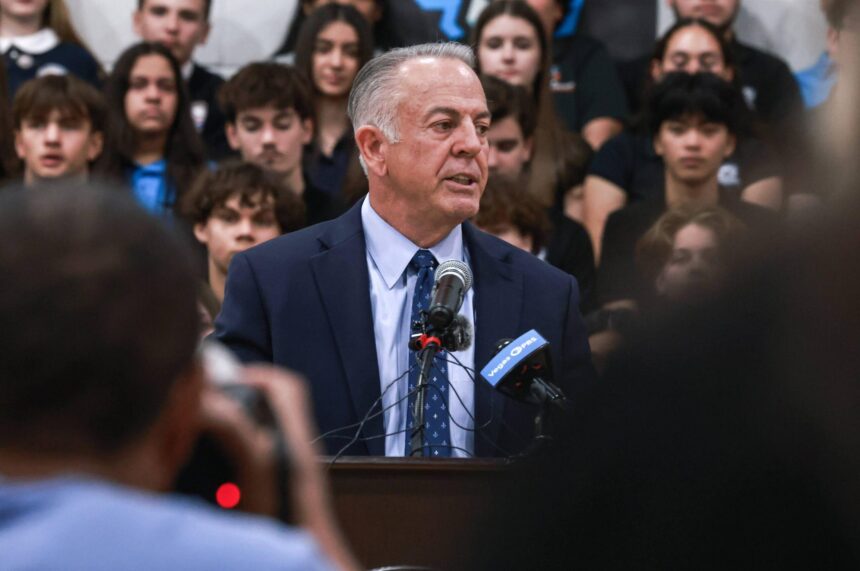Nevada’s New Education Reform: Raising the Bar for Student Achievement
Nevada Governor Joe Lombardo has unveiled a comprehensive education reform bill aimed at significantly enhancing student achievement and reinforcing accountability in public schools statewide. This legislation is a key element of Lombardo’s broader strategy to dismantle obstacles that contribute to underperformance, striving to “eliminate excuses” for lagging academic results. The bill proposes elevated standards for educators and school leaders, alongside robust mechanisms to ensure measurable progress in student learning outcomes. As the proposal sparks discussion, educators, parents, and administrators across Nevada are evaluating its potential effects on the education system.
Strengthening Standards to Drive Student Success
Governor Lombardo is championing a transformative approach to education by advocating for more rigorous academic standards and accountability measures. His plan challenges schools and teachers to meet ambitious performance goals, emphasizing that underachievement should no longer be tolerated. Central to the bill is the establishment of clear, data-driven benchmarks and real-time progress tracking to ensure transparency and continuous improvement.
Highlights of the proposed legislation include:
- Compulsory standardized assessments aligned with both state and national academic standards
- Annual comprehensive audits for schools that fall below performance expectations
- Reward systems to recognize educators and schools that consistently surpass targets
- Publicly accessible performance dashboards to enhance transparency and community engagement
| Academic Indicator | Current Performance | Target Goal |
|---|---|---|
| Mathematics Proficiency | 62% | 80% |
| Reading Proficiency | 67% | 85% |
| High School Graduation Rate | 75% | 90% |
Revamping Evaluation Systems for Educators and Schools
The bill introduces a revamped framework for assessing teacher effectiveness and school performance, moving beyond sole reliance on standardized test scores. It incorporates a multifaceted evaluation model that includes classroom engagement, participation in professional development, and feedback from students. This holistic approach aims to provide a more accurate reflection of teaching quality and school environment, addressing concerns that previous evaluation methods were too narrow.
Key elements of the new evaluation system include:
- Quarterly performance updates made available to parents and local communities
- Recognition initiatives celebrating outstanding educators and high-performing schools
- Focused support and funding for schools identified as underperforming to foster improvement
| Evaluation Component | Weight (%) | Sample Metrics |
|---|---|---|
| Student Academic Growth | 40 | Standardized test improvements, growth tracking |
| Engagement in Classroom | 30 | Observation ratings, student feedback surveys |
| Professional Development | 15 | Participation in training, certification achievements |
| Community and Parental Involvement | 15 | Parent surveys, involvement in school events |
Performance-Based Funding to Optimize Education Investments
In a notable departure from traditional funding models, Governor Lombardo’s bill proposes tying financial resources directly to schools’ achievement of specific performance goals. This results-oriented funding strategy is designed to incentivize schools to adopt innovative teaching methods and prioritize student success. By linking budget allocations to measurable outcomes, the legislation aims to ensure that education dollars are used effectively to foster academic excellence.
Core aspects of the funding model include:
- Defined achievement benchmarks: Schools must demonstrate progress in literacy, math proficiency, and graduation rates to qualify for funding
- Incentives for sustained improvement: Additional financial rewards for schools showing consistent growth over multiple years
- Annual public reporting: Transparent disclosure of performance data to maintain community trust and oversight
| Performance Indicator | Funding Adjustment |
|---|---|
| Increase in Student Proficiency | +10% Bonus Funding |
| Improvement in Graduation Rates | +15% Bonus Funding |
| Year-over-Year Academic Growth | +5% Bonus Funding |
| Failure to Meet Targets | Funding Reduction |
Diverse Perspectives on the Education Reform Proposal
The proposed education reforms have elicited a wide range of responses from Nevada’s education community. Proponents applaud the bill’s focus on elevating student achievement and introducing stringent accountability, viewing it as a vital step toward reversing chronic underperformance and restoring public confidence in schools. They particularly commend the emphasis on data-driven decision-making and transparent progress tracking as essential tools for raising educational standards.
However, some educators, union leaders, and parents express reservations about the potential drawbacks of the legislation. Concerns include the risk of punitive consequences overshadowing supportive measures, which could increase stress and burnout among teachers. Additionally, critics highlight the need to address disparities in resources and infrastructure, warning that without equitable investments, the reforms might inadvertently widen achievement gaps, especially in underserved communities.
- Advocates emphasize: clear objectives, transparency, and improved student outcomes
- Critics warn: resource inequities, teacher workload, and fairness issues
- Consensus centers on: balancing accountability with adequate support systems
| Group | Main Concern | Desired Result |
|---|---|---|
| Teachers | Support versus punitive measures | Fair evaluations and professional growth opportunities |
| Parents | Equitable resource distribution | Inclusive improvements and upgraded facilities |
| Policymakers | Accountability and measurable progress | Clear metrics and transparent reporting |
Looking Ahead: The Future of Education in Nevada
As Nevada prepares to potentially implement these sweeping education reforms, Governor Lombardo’s bill highlights a growing commitment to elevating academic standards and ensuring accountability across the state’s public schools. While supporters believe the legislation could catalyze significant improvements, ongoing discussions will be critical to address concerns about equitable implementation and support for educators. The ultimate success of this initiative will depend on balancing rigorous expectations with the necessary resources and assistance to foster lasting educational excellence throughout Nevada.










